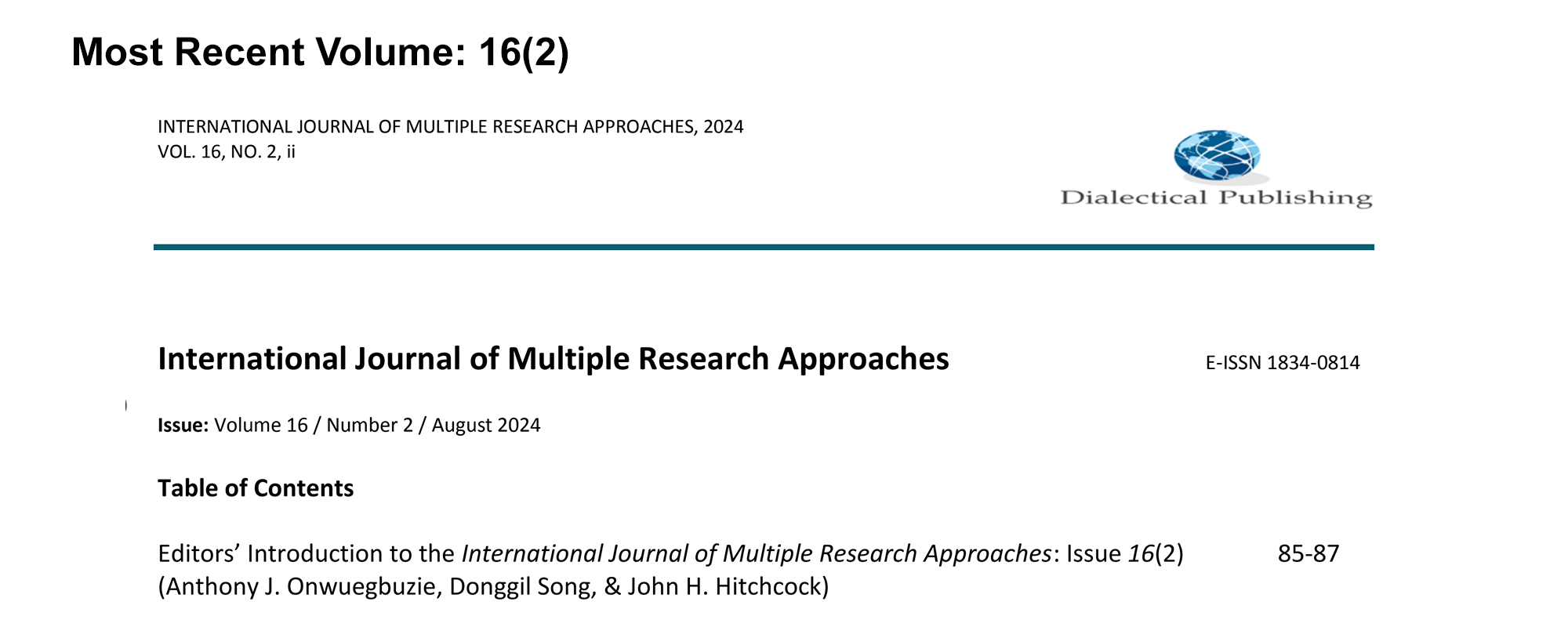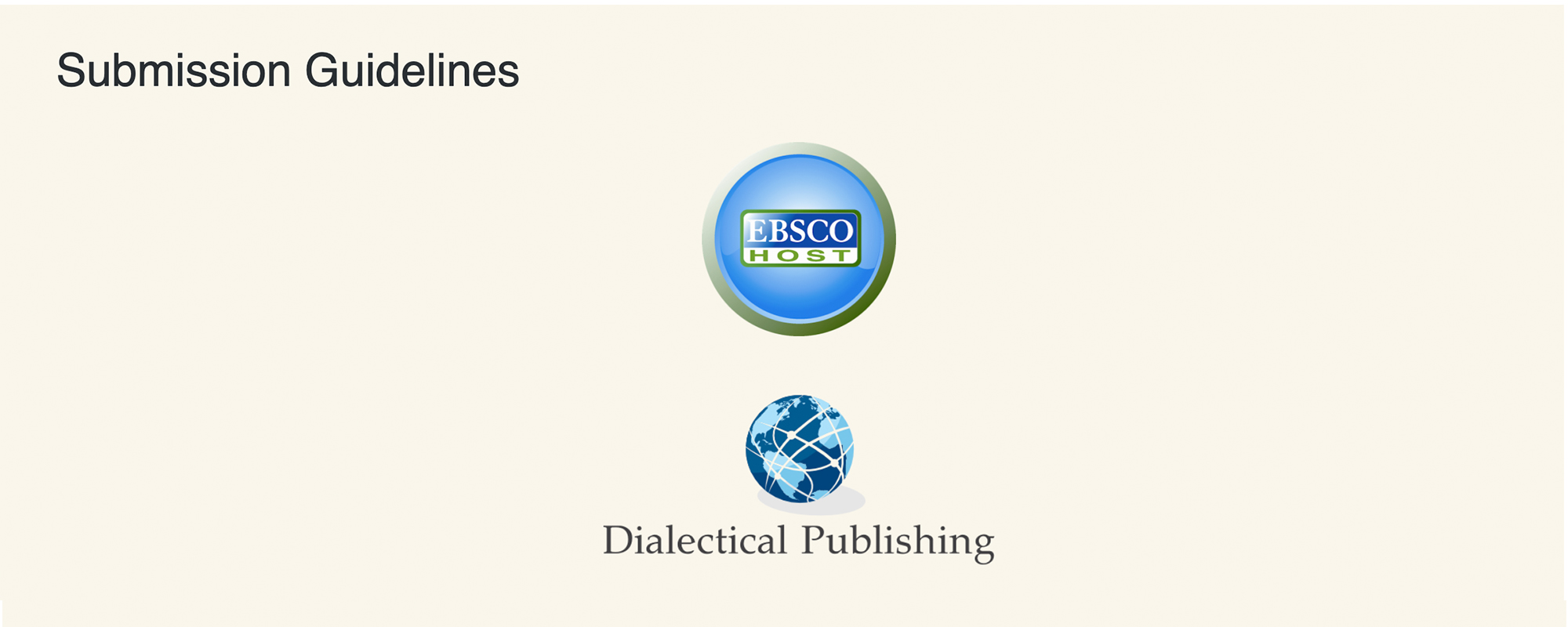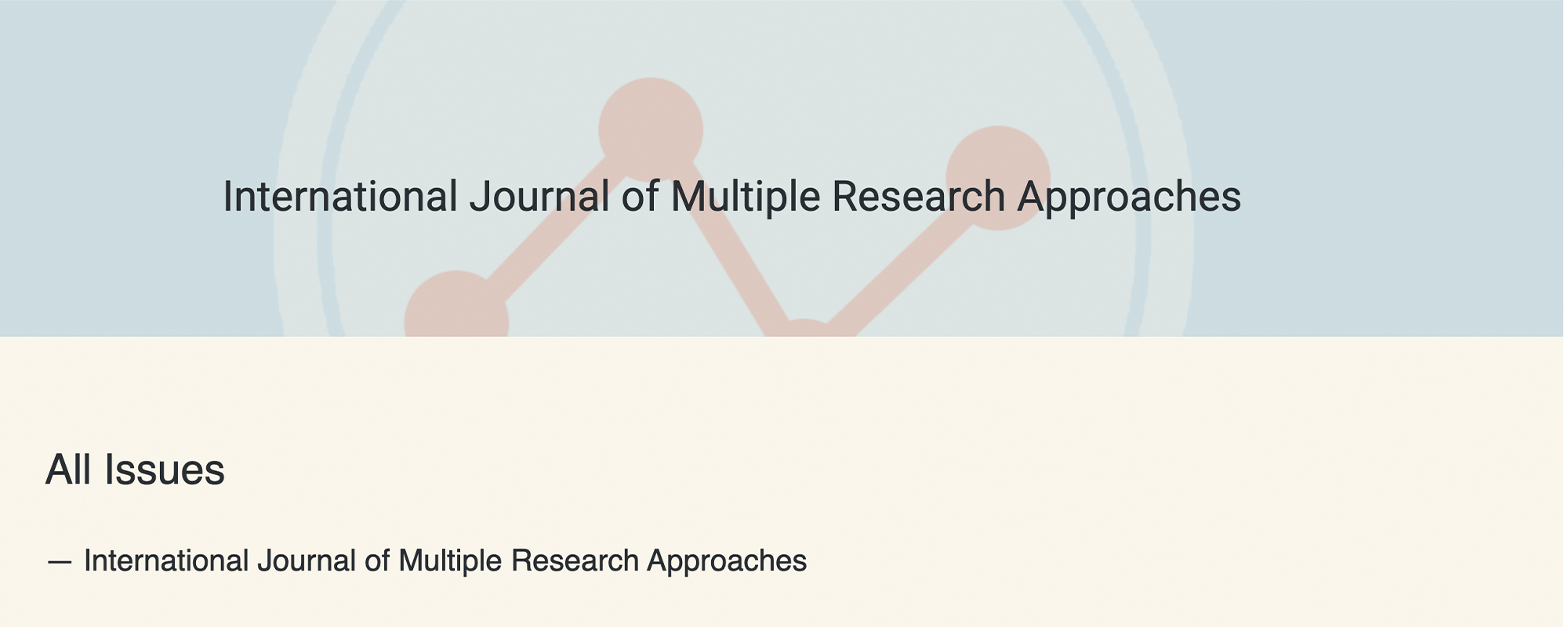International Journal of Multiple Research Approaches
eISSN: 18340814 | ISSN: 18340806 | Current volume: 16 | Current issue: 2 Frequency: Triannually




The International Journal of Multiple Research Approaches is indexed with EBSCO and ProQuest.

For submitting manuscripts for consideration for publication in the International Journal of Multiple Research Approaches via ScholarOne, please use the following link:
https://mc.manuscriptcentral.com/rmra
For details about developing publishable manuscripts in mixed methods, please read this editorial.
For a step-by-step guide to publishing journal articles and strategies for securing impactful publications, please read this article.
For “A 30-Step Guide to Publishing in Scholarly Journals”, presented as a webinar for the Textbook & Academic Authors Association (TAA), please use the link to Part 1 and Part 2.
Building on the seminal work of Brewer and Hunter (1989, 2006), Hunter and Brewer (2003, 2015a, 2015b), and Seawright (2016), multimethod research—also known as multiple methods research—is defined as research that systematically combines, mixes, or integrates more than one research method/methodology/paradigms/analyses/etc. to produce a high-quality research study. Thus, multimethod research includes the following four broad cases:
- (Case a) qualitative methods/methodologies/paradigms/analyses/etc. +…+ quantitative methods/methodologies/paradigms/analyses/etc. (i.e., qual +…+ quan)
- (Case b) qualitative methods/methodologies/paradigms/analyses/etc. +…+ qualitative methods/methodologies/paradigms/analyses/etc. (i.e., qual +…+ qual)
- (Case c) quantitative methods/methodologies/paradigms/analyses/etc. +…+ quantitative methods/methodologies/paradigms/analyses/etc. (i.e., quan +…+ quan)
- (Case d) Case a + Case b OR Case a + Case c
This definition leads to the following three corollaries:
- The ellipses in Cases a-c allow for the possibility of two or more methods/methodologies/paradigms/analyses/etc. being combined, mixed, or integrated.
- Case a is a special case of multimethod research, which is commonly referred to as mixed methods research.
- Case d represents what Onwuegbuzie and Hitchcock (2019b) conceptualized as representing the integration of multimethod research and mixed methods research, using one of two titles: (a) Multi-Mixed Methods Research or (b) Meta-Methods Research, as follows:
- The use of two titles is meant to capture the idea that a researcher might think of quantitative and qualitative information as a true dichotomy—what Fetters and Freshwater (2015) refer to as the 1 + 1 = 3 integration formula—in which case, Multi-Mixed Methods Research captures what we mean by Case d.
- Alternatively, some researchers might conceptualize fuller integration between quantitative and qualitative information—what Onwuegbuzie (2017) and Onwuegbuzie and Hitchcock (2019a) refer to as the 1 + 1 = 1 integration formula—in which case, the term Meta-Methods Research can be applied to understanding what we mean by Case d.
Building on the popularized definition of Johnson, Onwuegbuzie, and Turner (2007), mixed methods research (MMR)—also known as mixed research, mixed methodology, and integrated research—is an intellectual and practical synthesis based on qualitative and quantitative research. It is the third major research approach (along with qualitative and quantitative research). MMR recognizes the importance of traditional quantitative and qualitative research, but also offers a powerful third choice that often will provide the most informative, complete, balanced, and useful research results. Furthermore, MMR is the research approach that (a) often partners with the philosophy of pragmatism in one of its forms (left, right, middle); (b) follows the logic of mixed methods research (including a both-and-logic, the logic of the fundamental principle of MMR, and any other useful logics imported from qualitative or quantitative research that are helpful for producing defensible and usable research findings); (c) relies on qualitative and quantitative viewpoints, data collection methods, methodologies, paradigms, sampling, analysis, inference techniques, and the like combined according to the integrative logic of mixed methods research to address one’s research question(s); and (d) is cognizant, appreciative, and inclusive of local and broader sociopolitical realities, resources, and needs. Furthermore, the mixed methods research approach offers an important approach for generating and testing critical research questions for drawing full and warranted conclusions about the world in which we live.
Recently, Onwuegbuzie and Hitchcock (2019b) have outlined a fourth major research category (i.e., Case d) with two approaches. Motivated by a both/and logic and driven by a quest for full(er) integration, they used mathematical formulae to provide proof for the case of integrating mixed methods research and multiple methods research approaches within the same study—leading to what they coined as multi-mixed methods research (i.e., partial integration) and meta-methods research (i.e., full[er] integration). This category of research approaches are consistent with Johnson’s (2017) both/and principle that is an essential component of both dialectical pluralism (Johnson, 2017) and critical dialectical pluralism (Onwuegbuzie & Frels, 2013).
The International Journal of Multiple Research Approaches is dedicated to publishing scholarship that advances methodological thinking pertaining to Cases a-d, or explores innovative and/or novel application of methods associated with each case.
References
Brewer, J., & Hunter, A. (1989). Multimethod research: A synthesis of styles. Newbury Park, CA: Sage.
Brewer, J., & Hunter, A. (2006). Foundations of multimethod research: Synthesizing styles. Thousand Oaks, CA: Sage.
Hunter, A., & Brewer, J. (2003). Multimethod research in sociology. In A. Tashakkori & C. Teddlie (Eds.), Handbook of mixed methods in social and behavioral research (pp. 577-594). Thousand Oaks, CA: Sage.
Fetters M. D., & Freshwater, D. (2015). The 1 + 1 = 3 integration challenge. Journal of Mixed Methods Research, 9, 115-117. doi:10.1177/1558689815581222
Hunter, A., & Brewer, J. (2015a). Designing multimethod research. In R. B. Johnson & S. Hesse-Biber (Eds.), Oxford handbook of multimethod and mixed methods research inquiry (pp. 185-205). New York, NY: Oxford University Press.
Hunter, A., & Brewer, J. (2015b). Conundrums of multimethod research. In R. B. Johnson & S. Hesse-Biber (Eds.), Oxford handbook of multimethod and mixed methods research inquiry (pp. 616-623). New York, NY: Oxford University Press.
Johnson, R. B. (2017). Dialectical pluralism: A meta-paradigm whose time has com. Journal of Mixed Methods Research, 11, 156-173. doi:10.1177/1558689815607692
Johnson, R. B., Onwuegbuzie, A. J., & Turner, L. A. (2007). Toward a definition of mixed methods research. Journal of Mixed Methods Research, 1, 112-133. doi:10.1177/1558689806298224
Onwuegbuzie, A. J. (2017, March). Mixed methods is dead! Long live mixed methods! Invited keynote address presented at the Mixed Methods International Research Association Caribbean Conference at Montego Bay, Jamaica.
Onwuegbuzie, A. J., & Frels, R. K. (2013). Introduction: Towards a new research philosophy for addressing social justice issues: Critical dialectical pluralism 1.0. International Journal of Multiple Research Approaches, 7, 9-26. doi:10.5172/mra.2013.7.1.9
Onwuegbuzie, A. J., & Hitchcock, J. H. (2019a). Toward a fully integrated approach to mixed methods research: Mixed Research 2.0. International Journal of Multiple Research Approaches, 11, 7-28. doi:10.29034/ijmra.v11n1editorial1
Onwuegbuzie, A. J., & Hitchcock, J. H. (2019b). Using mathematical formulae as proof for integrating mixed methods research and multiple methods research approaches: A call for multi-mixed methods and meta-methods in a mixed research 2.0 era. International Journal of Multiple Research Approaches, 11, 213-234. doi:10.29034/ijmra.v11n3editorial2
Seawright, J. (2016). Multi-Method social science: Combining qualitative and quantitative tools. Cambridge, England: Cambridge University Press.